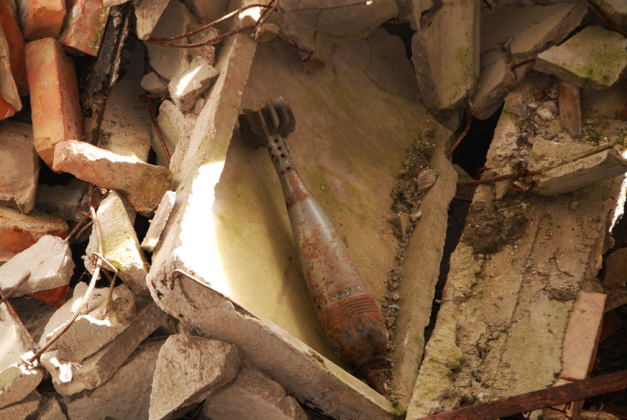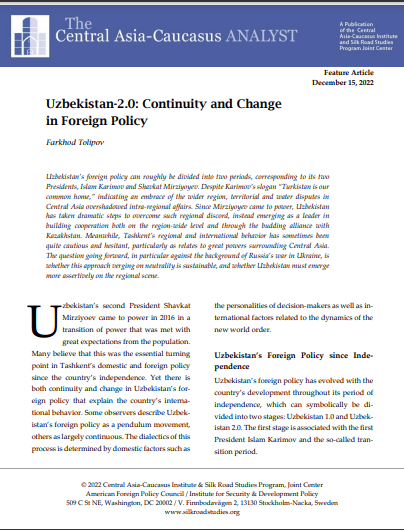Uzbekistan’s Constitutional Referendum
By Farkhod Tolipov
June 14, 2023
On April 30, 2023, Uzbekistan held a referendum on amendments to the country’s Constitution. The referendum was preceded by an ambitious propaganda campaign calling on people not to be indifferent and to actively participate in the referendum. However, the controversial text of the draft Constitution appeared to be worked out in closed cabinets of the Constitutional Commission without broader engagement of experts and civil society representatives. Loud propaganda, in the spirit of Soviet tradition, contrasted with the silence of ordinary citizens and their very low level of awareness of the content of the document subjected to the vote.

Uzbekistan-2.0: Continuity and Change in Foreign Policy
By Farkhod Tolipov
December 15, 2022
Uzbekistan’s foreign policy can roughly be divided into two periods, corresponding to its two Presidents, Islam Karimov and Shavkat Mirziyoyev. Despite Karimov’s slogan “Turkistan is our common home,” indicating an embrace of the wider region, territorial and water disputes in Central Asia overshadowed intra-regional affairs. Since Mirziyoyev came to power, Uzbekistan has taken dramatic steps to overcome such regional discord, instead emerging as a leader in building cooperation both on the region-wide level and through the budding alliance with Kazakhstan. Meanwhile, Tashkent’s regional and international behavior has sometimes been quite cautious and hesitant, particularly as relates to great powers surrounding Central Asia. The question going forward, in particular against the background of Russia’s war in Ukraine, is whether this approach verging on neutrality is sustainable, and whether Uzbekistan must emerge more assertively on the regional scene.
Turkmenistan Lifts Its Head
By S. Frederick Starr
December 2, 2022
In recent months Turkmenistan has emerged from its self-imposed shell. Under its new president, Serdar Berdimuhamedov, it has launched a very active, though still cautious, foreign policy. While reaffirming its neutral status, which the UN recognized in 1995, it has intensified its relations with all the global powers and, significantly, with its neighbors as well. Both the U.S. and EU have applauded these initiatives and the new president’s strategic concept that underlies them. However, events unfold, Turkmenistan has decisively lifted its head, and will henceforth be a significant factor in regional and continental affairs and not simply a perplexing outlier.

President Mirziyoyev’s Strategic Urgency
By S. Frederick Starr
September 6, 2022
Speaking on Uzbekistan’s independence day, President Shavkat Mirziyoyev addressed a somber memorial ceremony dedicated to the “victims of political repression” during the Soviet era. He focused on the Uzbek reformers known as Jadids that were killed or suppressed in the early Soviet period. He also addressed at length Moscow’s singling out of Uzbekistan during the “cotton crisis” of the 1980s. This speech was remarkable because it effectively shifted the blame for Uzbekistan’s historical woes from Stalin or Communism to Russian imperialism. The same day, Mirziyoyev pledged to expand the power of the country’s armed forces, indicating the seriousness with which Uzbekistan’s leaders view developments in recent months, chief among them Russia’s invasion of Ukraine.

ISKP Attacks in Uzbekistan and Tajikistan
By Sudha Ramachandran
August 31, 2022
Since April this year, the Islamic State Khorasan Province (ISKP), the Afghan affiliate of the terrorist organization known as the Islamic State of Iraq and Syria (ISIS), has carried out rocket attacks in Uzbekistan and Tajikistan from its bases in northern Afghanistan. The attacks are significant. This is the first time that the jihadist group is targeting countries in Central Asia. They signal the ISKP’s expanding geographic presence inside Afghanistan as well as its growing ambitions in Afghanistan and Central Asia. Western countries that are concerned about terrorism emanating from Afghanistan should take note of the implications of the recent attacks.




